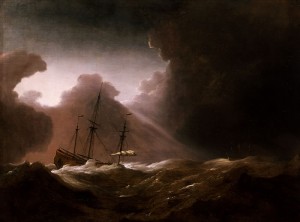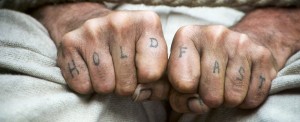There has been a lot of fur flying around lately regarding prodigal groups (possibly) coming back into the fold, while others get a solid scolding, etc. Since the season of Advent, Catholics have endured changes to the Liturgy and a new version of the Missal, and we’ve had to relearn lines we had memorized since forever. And lately the HHS Mandate has been seen as a galvanizing moment by many, me among them, and only as a distraction by others. In the immortal words of Rodney King, “can’t we all just get along?”
When I was a student at UCLA, I had a professor who introduced a concept that flew over the heads of many of my peers, but which made all the sense in the world to me: the concept of bounded rationality as defined by economist, and Nobel Laureate, Herbert Simon. Let’s call it BR for the duration of this post, shall we? The shorthand answer for what BR means is this: human rationality is limited. As such, when faced with making decisions, we do not have complete information. Even so, still we must decide. Here is the text book definition of BR (bold highlights are mine):
In game theory, bounded rationality is a concept based on the fact that rationality of individuals is limited by the information they have, the cognitive limitations of their minds, and the finite amount of time they have to make decisions. This contrasts with the concept of rationality as optimization. Another way to look at bounded rationality is that, because decision-makers lack the ability and resources to arrive at the optimal solution, they instead apply their rationality only after having greatly simplified the choices available.
So what this boils down to is, there are two types of decision makers out there, and you are either the one, or the other. See which one fits you closest: (a) the optimizer, who wants to weigh everything and make the optimal choice to the best of their ability, so they are sure they made the best choice; and (b) the satisficer, who chooses that which might not be optimal but which will be “good enough.” Furthermore, consider that the goal of decision making is utility or happiness. You may be both an optimizer in some cases, and a satisficer in others.
The advertising industry, think “Madison Avenue,” appeals to your internal optimizer when they make their pitches for products to you. Need an example? Just check the ads in the sidebar.==>> You’ll never see an advertising pitch done to appeal to your “that’s just good enough” or satisficing side. No, you need and deserve the best, right? Claims on achieving the whitest whites, and brightest brights sell more detergent than “Dharma Initiative Plain Wrapper Detergent: It get’s the job done, on a deserted island, where there are no stores.”
When I learned of BR, why did this concept fit so well with me? Well, I was a former Marine by the time I hit the campus, the “older returning student” and stuff that may seem fuzzy to average undergraduates right out of high school, like making important decisions in chaotic conditions with incomplete data, was just another day on the job for me back in the Corps. Marines and fluid situations kind of go hand in hand. And even if they aren’t compatible to you personally, they are the real world that anyone in an organization, especially in the military, faces.
So what the heck does this have to do with Why I am Catholic? Everything, actually. If you have followed my conversion story, you know that I first started studying Catholicism in order to prove that it was in error. But when everything that I picked up, from Pascal’s Pensees, The Imitation of Christ, The Seven Storey Mountain, and the Desert Fathers, coupled with close reading of the Bible, proved to me beyond a reasonable doubt that Catholicism was True, I made a satisficing decision to join her ranks.
Notice I did not say proved beyond a shadow of a doubt. That is impossible to do, see, with certainty. Nothing is certain, except death and taxes, and I had come close to dying once already, and April 15 comes around every year like clockwork.
So guess what I did? I remembered my experience in the real world, bolstered by something I learned in the classroom, coupled it with faith, and I let all the other questions that were preventing me from making the optimal decision to become a Catholic, fall to the wayside.
Questions like, What about all the miracles that seem to happen only to Catholics? And what is up with the visions of Mary appearing in Lourdes, Fatima, and Guadalupe? Or what’s with the miracles where St. Francis and Padre Pio showed the Stigmata (the stigwhata?), for example. Right up to deep doctrinal questions that were way above my pay grade, like the Immaculate Conception, the Assumption of Mary, Purgatory, etc.
I didn’t have all the answers to these mysteries, but I have come to believe that the Catholic Church does. And the wonderful thing is that I now have learned lots more about the Church, and so far, the more I learn about these big questions and the answers our Church has for them, the greater my faith in her has grown. As I have written before, the Church has admittedly strayed at times from staying focused on the “signal” by pandering to, and sometimes falling prey to, those who love “the noise.” Yet still She survives, like the unsinkable warship in the portrait below, because she always gets back on course. She stays the course because her navigator is the Holy Spirit, God who on earth works wonders through fallible mankind, as He has since he created us.
 The decision I made to become Catholic was ultimately one guided by reason, bounded by the limits of rationality, and then actuated by faith. Faith and the optimal decision making model don’t go together nearly as well as faith and Bounded Rationality.
The decision I made to become Catholic was ultimately one guided by reason, bounded by the limits of rationality, and then actuated by faith. Faith and the optimal decision making model don’t go together nearly as well as faith and Bounded Rationality.
Example time. How do children make decisions to befriend someone? Do they carefully and methodically weigh every single piece of pertinent information about that person before making a decision to play with them, like the optimizer? I don’t remember doing that. And from my experience with my own children, I can attest to the fact that in my household at least, that model doesn’t fly. But usually they have made pretty good choices regarding who they like to play and hang out with because the most important thing to them is the playing, not searching for the optimal playmate.
Our Lord said,
Amen, I say to you, unless you turn and become like children, you will not enter the kingdom of heaven. Whoever humbles himself like this child is the greatest in the kingdom of heaven.
These thoughts of Christ are ultimately the ones that helped me to put aside my objections to becoming Catholic and decide to join her ranks. Unless you turn are the operative words here. I put aside my inner optimizer and made the satisficing decision, as I would have done as a child making a new friend. Like I would have done in a chaotic situation that demanded supreme focus and a quick decision as a Marine. Like I did when deciding to join the Marines in the first place.
I made the decision based on the limited amount of information I needed and faith, knowing full well that I alone would not be in control of my destiny as a result. I prayed, and then I obeyed the call. When the seas get rough now and then, and I begin to feel like I’m about to be thrown overboard, I remember that I am not the one at the helm, the Holy Spirit is. My viewpoint, though I delude myself that I see the big picture (ha!), is infinitesimally small.
Remember the painting above? It depicts a vision (Catholics have all the miracles!) that St. John (Don) Bosco had in 1862. In the dream, he saw a terrible sea battle with thousands of craft, large and small, launched against a single stately warship symbolizing the Church. The ship had been damaged several times by the foe, but was still proudly afloat. Directed by the Pope, she was able to anchor herself securely between two pillars rising out of the sea. On top of the first pillar was a large Host, Our Eucharistic Lord, and the words Salus credentium or Salvation of believers. The second pillar was smaller and there was a statue of Mary Immaculate on it with the words Auxilium Christianorum or Help of Christians.
When the weather gets rough, and the seas get storm tossed, we can’t ask for better allies than Our Lord, and Our Lady. That fact, and remembering my pay-grade (seaman apprentice), and the limits of my perspective (lilliputian), helps me to hold fast through the inevitable gales in the life of a Catholic sailor.
UPDATE: Fr. Dwight Longenecker provides another example of bounded rationality meeting faith.














